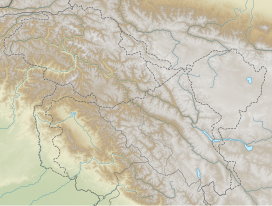Stok Kangri (6,153 metres (20,187 ft)) is the highest mountain in the Stok Range of the Zazkar Mountains a Trans-Himalayan mountain in the Ladakh region of north India. The peak is located in Hemis National Park,[3] 12 km southwest of the trailhead (3,610 metres (11,844 ft)) in the village of Stok and around 15 km southwest of the city of Leh, the capital of Ladakh.
| Stok Kangri | |
|---|---|
 Stok Kangri as seen from the Shanti Stupa, Leh. | |
| Highest point | |
| Elevation | 6,153 m (20,187 ft)[1] |
| Prominence | 810 m (2,660 ft)[2] |
| Listing | Ultra |
| Coordinates | 33°59′10″N 77°26′33″E / 33.98611°N 77.44250°E |
| Geography | |
| Parent range | Stok Range |
| Climbing | |
| First ascent | 1951 |


Despite its high altitude, Stok Kangri is a popular trekking peak and is often climbed as an initial non-technical foray into high altitude mountaineering. However, the difficulty of Stok Kangri is often underestimated and the need to acclimatise before and during the ascent makes Stok Kangri an enduring challenge.[4][5]
In late July and August, all but the top of the peak may be snow-free. The elevation data was verified by GPS readings from 11 satellites at the Summit during a late July 2007 joint Nepalese-US expedition which encountered snow cover for 85% of the final four-hour, four km, 900 metre climb. Another GPS reading provided a 6136-meter elevation.[6] The shortest route to the peak is along the Stok valley, following the Stok Chu to Stok village.[7] This valley's grazing landscape, especially near the village, was devastated by the 2010 Ladakh floods, the most severe in decades.[8]
In December 2019, the All Ladakh Tour Operators Association announced that Stok Kangri is closed for trekking and climbing from 2020 to 2023, due to over-tourism. The interval is meant to give the region a chance to recuperate.[9]
Ascent
editThe peak is considered non-technical during July–September, but becomes quite technical during the height of winter. Even in summer, novices should be well prepared, with appropriate physical fitness and equipment.[10] The climb is exhausting and requires a good amount of stamina, both physically and mentally. The First official winter ascent was made by a British team in March 2002, Led by Ross Cooper, with Chris Hall, Paul Janlid, Mykl White, and Caroline Williams. At the age of 20 years, Ross Cooper was the youngest expedition leader recorded by the IMF.[11]
It takes two days to reach base camp (4,969 metres (16,302 ft)) from the village of Stok, and it is required to be well acclimatized to the altitude before starting the trek.[12] The summit day lasts 8–14 hours, ascending over 1,000 metres (3,281 ft) from Stok Kangri's base camp to its summit.[13]
References
edit- ^ Aitken, Bill (2003). Footloose in the Himalaya. Orient Blackswan. p. 188. ISBN 9788178240527.
- ^ "Stok Kangri". Peak Bagger. Retrieved 12 October 2024.
- ^ "Hemis National Park on Google Maps". Retrieved 28 October 2016.
- ^ Majumdar, Arjun. "Why the Stok Kangri trek in Ladakh is meant for the experienced trekker". indiahikes.com. Retrieved 28 October 2016.
- ^ Allen, Nick. "Stok Kangri: A Different Kind of Success". www.masteringmountains.org. Retrieved 28 October 2016.
- ^ "Stok Kangri GPS Measured". nalajcie.org/2013/09/23/stok-kangri-trekking/. 23 July 2013. Retrieved 26 January 2018.
- ^ Partha S Banerjee (2016). Ladakh and Zanskar Trekking Map (Map). 1:175,000. Milestone Himalayan Series. Kolkata: Milestone Books. ISBN 978-81-903270-9-1.
- ^ "Ladakh Floods & Climbing Mountains, India – August 2010 | Stephen Cunliffe". www.stevecunliffe.com. Retrieved 28 October 2016.
- ^ "Stok Kangri To Close For 3 Years". The Outdoor Journal. 6 December 2019.
- ^ Dam, Satyabrata. "Climbing Stok Kangri". Times of India Travel.
- ^ "Trekkers Guide for Stok Kangri". www.thefreebird.net.
- ^ "Stok Kangri climb (6153m)". 18 March 2019.
- ^ "Stok Kangri – Itinerary". www.jagged-globe.co.uk. Retrieved 28 October 2016.
Loram, C., 2004, Trekking in Ladakh (3rd Edition), India Trekking Guides, Trailblazer Publications, 304 p., ISBN 978-1873756751.
